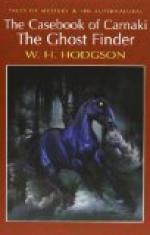“And now I come to that last, dreadful thing. There has been no further manifestation of anything abnormal so that there is an extraordinary uncertainty in my conclusions. If we had not heard those last sounds and if Parsket had not shown that enormous sense of fear the whole of this case could be explained in the way in which I have shown. And, in fact, as you have seen, I am of the opinion that almost all of it can be cleared up, but I see no way of going past the thing we heard at the last and the fear that Parsket showed.
“His death—no, that proves nothing. At the inquest it was described somewhat untechnically as due to heart spasm. That is normal enough and leaves us quite in the dark as to whether he died because he stood between the girl and some incredible thing of monstrosity.
“The look on Parsket’s face and the thing he called out when he heard the great hoof sounds coming down the passage seem to show that he had the sudden realization of what before then may have been nothing more than a horrible suspicion. And his fear and appreciation of some tremendous danger approaching was probably more keenly real even than mine. And then he did the one fine, great thing!”
“And the cause?” I said. “What caused it?”
Carnacki shook his head.
“God knows,” he answered, with a peculiar, sincere reverence. “If that thing was what it seemed to be one might suggest an explanation which would not offend one’s reason, but which may be utterly wrong. Yet I have thought, though it would take a long lecture on Thought Induction to get you to appreciate my reasons, that Parsket had produced what I might term a kind of ‘induced haunting,’ a kind of induced simulation of his mental conceptions to his desperate thoughts and broodings. It is impossible to make it clearer in a few words.”
“But the old story!” I said. “Why may not there have been something in that?”
“There may have been something in it,” said Carnacki. “But I do not think it had anything to do with this. I have not clearly thought out my reasons, yet; but later I may be able to tell you why I think so.”
“And the marriage? And the cellar—was there anything found there?” asked Taylor.
“Yes, the marriage was performed that day in spite of the tragedy,” Carnacki told us. “It was the wisest thing to do considering the things that I cannot explain. Yes, I had the floor of that big cellar up, for I had a feeling I might find something there to give me some light. But there was nothing.
“You know, the whole thing is tremendous and extraordinary. I shall never forget the look on Parsket’s face. And afterward the disgusting sounds of those great hoofs going away through the quiet house.”
Carnacki stood up.
“Out you go!” he said in friendly fashion, using the recognized formula.
And we went presently out into the quiet of the Embankment, and so to our homes.




